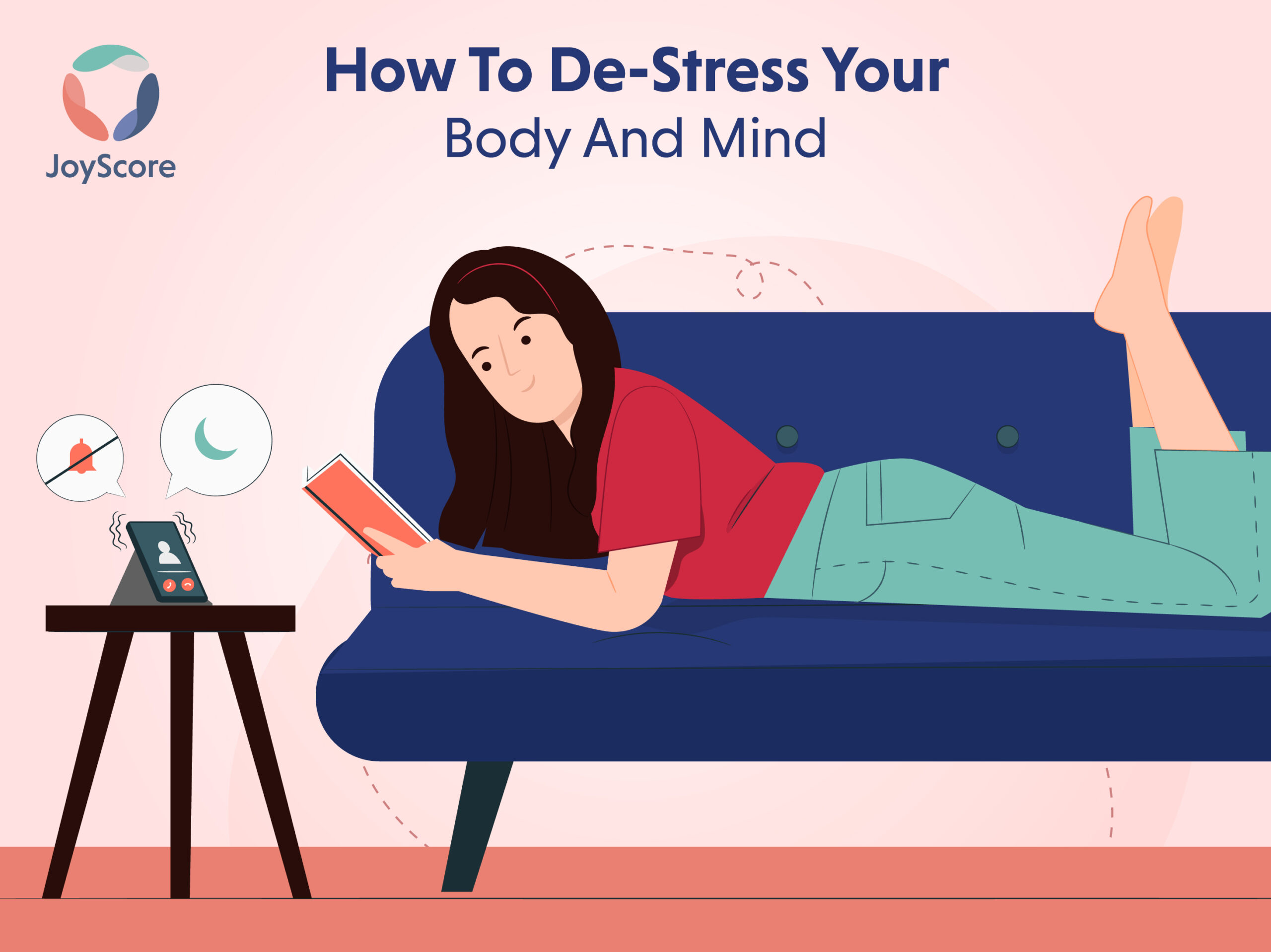Stress is a significant factor in today’s society. Whether at work or school, you’re always on the go, and sometimes you feel like you’re being pulled in too many directions. This can cause stress, which can endanger your physical health. If you don’t take care of yourself, your body and mind will eventually hurt and feel exhausted.
Try some of these ways to de-stress your body and mind today if this sounds familiar!
- Exercise regularly
Exercise increases your overall health and sense of well-being. But exercise also has some direct de-stressing benefits. It pumps up your endorphins. It makes you sweat, and sweating is healthy. It also refocuses your mind on your body’s movements, which can distract you from daily worries.
- Follow a healthy and balanced diet.

Eat a nutritious diet to keep your body functioning well and regulate your blood sugar levels. This will help keep your energy levels up and help you manage stress and depression.
It’s important not to skip meals if you’re feeling stressed, as this can harm your mood. Try to eat as healthily as possible, and try not to overeat or snack on sugary foods.
You may find that it helps to plan meals. This can help you make sure you eat healthily, and it can also save time when you’re busy or feeling stressed.
- Reduce screen time
The artificial light from mobile phones, laptops, and television disrupts our sleep-wake cycle’s circadian rhythm. This results in poor quality of sleep, which increases your body’s cortisol level, thereby increasing your stress levels.
You can solve this problem by reducing your screen time to at least one hour before bedtime. Try reading an e-book or listening to soothing music instead of watching television or working on your laptop before bed.
- Practice self-care
Taking time out for yourself and doing something that makes you happy is one of the best ways to relax. But it’s often the first thing people neglect when they’re busy or stressed. Find something that works for you — whether it’s going on a long walk, reading a book, or getting a massage — and make it a priority each week.
- Spend time with your loved ones.
If you’ve just had a particularly stressful day or feel a little under the weather, you can always ask yourself if there is someone you could offer support to. If you don’t feel like speaking to anyone, try sending them a text message to let them know they’re on your mind.
This way, not only are you helping someone else out and possibly calming them down, but you will feel much better too!
- Learn to say no.
You don’t have to do everything you’re asked. If someone asks for help or favor you don’t want to give, learn to say no, using phrases such as: “I’m sorry, but I’m too busy at the moment”; or “I’m not able to do that, but I could do….”
Saying no is easier if you know why you’re doing it. You might feel guilty about it at first, but try to remember that by saying no when you want to, you’ll have more time and energy for the things you do want to do.
- Avoid Procrastination
Procrastination is one of the most significant stress-causing factors in the workplace. It’s not just that you’re putting off something important – it’s that you’re probably doing other things to distract yourself, which can add up to far more time than simply doing the task at hand.
To avoid procrastinating:
● Set deadlines.
● Schedule time for essential tasks.
● Break projects down into manageable steps.
● Ask for help.
- Practice mindfulness

Mindfulness involves focusing your attention on the present moment and accepting it. Mindfulness meditation is an exercise where you focus on your breathing or a simple mantra such as “I am calm” while sitting quietly. If a distracting thought enters your mind, refocus yourself on the mantra or the peaceful feeling of taking deep breaths.
- Spend time in nature

Many studies have shown that spending time in nature can reduce stress and anxiety, improve your mood and overall well-being, and boost your self-esteem. In addition, people who spend more time outside tend to be healthier, as outdoor exercise is an integral part of many people’s active lifestyles.
- Meditate
Meditation is a great way to reduce stress. Research shows that meditation can reduce anxiety, depression, fatigue, pain, and other physical symptoms of stress. It can also help you better manage and cope with the stressors in your life.
Meditation is simple and easy to practice once you learn how. There are different types of meditation, but they all involve sitting quietly and focusing on something like your breathing or a word or phrase that has meaning for you.
If you’re just getting started, try this simple technique: Sit comfortably with your eyes closed and focus on breathing.
- Take out your stress with a stress ball.
They might sound silly, but they work—squeezing a ball helps release tension in your muscles. They’re also a great, discreet way to relieve stress at work or in public.
- Write

Writing down what’s bothering you can help you feel less stressed. It may even help you find solutions to problems that seem impossible when they’re swirling around in your head. Start by making a list of everything worrying you, and then plan how you might tackle each one. For example, write down any changes that may help you if work stresses you out.
- Listen to music and move your body.
There are many ways to de-stress your body and mind. For starters, you can listen to music. Music therapy is an effective treatment for stress, depression, and anxiety.
Get moving. Going for a walk or doing some stretches will release tension in your body and help clear your mind.
As you lie in bed at the end of each day, go over your to-do list tomorrow. Think about any tasks you can cross off right away. Get an earlier start on any complicated tasks. Give yourself the gift of plenty of time each day to have enough breathing room to de-stress. Download the Joyscore app for more tips to reduce stress and anxiety.
Download on the Appstore
Get it on Google Play



